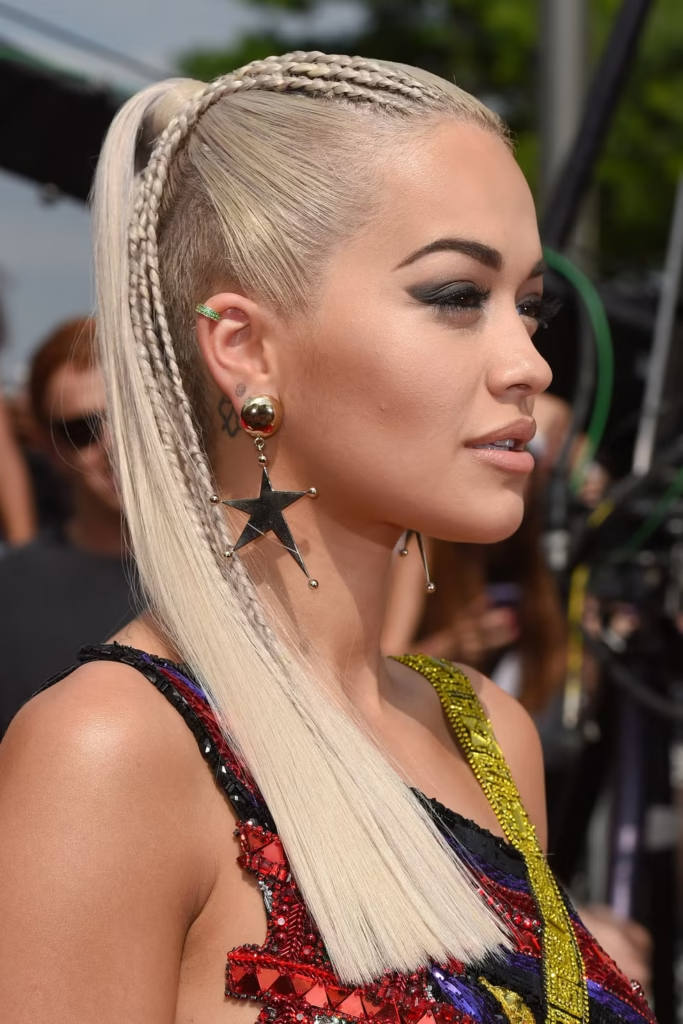White braids, often referring to braided hairstyles worn by individuals with white or light-colored hair, encompass a variety of styles and carry diverse cultural and aesthetic implications.
Here’s an overview:
Table of Contents
Cultural and Historical Significance of Braids
Braiding is an ancient art form found across numerous cultures worldwide.
In African societies, braids have historically signified social status, tribal affiliation, age, and marital status.
For instance, the Fulani tribe of West Africa is renowned for intricate braided styles that denote identity and heritage.
Similarly, in Native American traditions, braids symbolize unity and a connection to the earth, often worn during spiritual ceremonies
In Viking culture, braids served both functional and symbolic purposes, indicating rank and protecting hair during battles.
Braids in Contemporary Fashion
In modern times, braids have transcended cultural boundaries and become a popular fashion statement among individuals of various background.
For white individuals, braided hairstyles such as French braids, Dutch braids, and box braids are often chosen for their aesthetic appeal and versatility
Some contemporary styles incorporate color variations, including platinum or white hues, achieved through hair dye or extension.
These styles are often showcased in fashion magazines and social media platforms, highlighting their adaptability and trendiness.
Cultural Appropriation Considerations With White Braids
While braids are embraced globally, it’s essential to approach their adoption with cultural sensitivity.
Wearing hairstyles deeply rooted in specific cultures, such as cornrows or Fulani braids, without acknowledging their origins can lead to accusations of cultural appropriation.
This is particularly pertinent when individuals from dominant cultures adopt styles from marginalized communities without understanding their significance
Engaging with these styles respectfully involves educating oneself about their history, acknowledging their cultural roots, and supporting communities from which these traditions originate.
Best Practices for Wearing Braids Respectfully
- Educate Yourself Understand the cultural origins and significance of the braided style you choose.
- Acknowledge and Respect Give credit to the cultures that developed these styles and avoid claiming them as new or solely a fashion statement.
- Support Authentic Sources If seeking to wear traditional braided styles, consider consulting hairstylists from the respective cultures to ensure authenticity and support for those communities.
In summary, while braids are a versatile and widely appreciated hairstyle, it’s crucial to approach them with awareness and respect for their rich cultural histories.
Braid hairstyles white females offer a versatile and stylish way to elevate any look while also serving as a practical option for managing hair.
These braided styles have long transcended cultural boundaries, providing both aesthetic appeal and functionality.
However, it’s important to consider hair texture to achieve the best results.

READ ALSO: Blue Dye Hair: How to Achieve, Maintain, and Keep Your Color Vibrant in 2025
Understanding Hair Texture and Braid Types
Caucasian hair typically differs from African hair in that it tends to be finer, straighter, and less porous.
This means that certain braiding techniques may need to be adjusted to ensure the style holds well and lasts longer.
Popular braid styles suitable for white hair include:
White Braids Hairstyles #1: Dutch Braids
Also known as reverse French braids, these create a raised appearance and are perfect for both casual outings and formal events.
White Brades #2: Fishtail Braids
This intricate style adds elegance and sophistication, making it a favorite for special occasions.
Braid Hairstyles White #3: Waterfall Braids
Offering a cascading effect, this braid adds a romantic touch to any look.
Photo credits: Getty Images